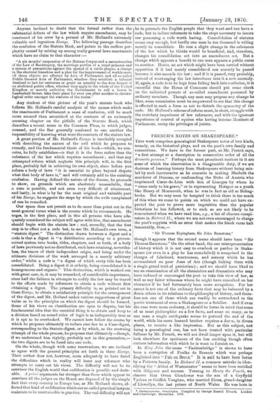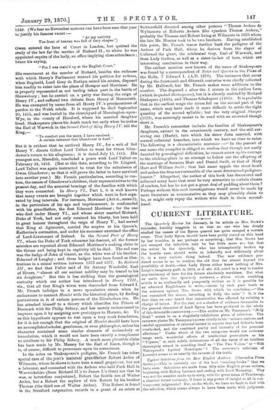FRENCH'S NOTES ON SHAKESPEARE.*
Tins work comprises genealogical Shakespeare notes of two kinds, namely, on the historical plays, and on the poet's own family and connections. We have in the former part, as Mr. French says, "a first attempt at a description in consecutive order of all the dramatis persons." Perhaps the most prominent matters in it are some of which the observation is a disagreeable duty, if we are desirous of learning history from Shakespeare without being mis- led by such inaccuracies as he commits in making Macbeth the murderer of Duncan, or confounding the Duke of Austria who imprisoned Cesar-de-Lion with him of Limoges by whom he "came early to his grave," or in representing Hotspur as a youth like Henry of Monmouth, when he was in fact as old as Boling- broke. But we may soon be tempted to think there is too much of this when we come to points on which we could not have ex- pected the poet to prove more inquisitive than the popular historians he has followed, or to such as are not likely to be remembered when we have read him, e.g., a list of obscure conspi- rators in Richard II., where we are not even encouraged to charge the poet's copyists with an error that makes the blank verse halt lamentably, thus,— " Sir Thomas Erpingham, Sir John Ramstone," though it appears that the second name should have been "Sir Thomas Ramstone." On the other hand, the one misrepresentation of history which it is not easy to overlook or pardon in Shake- speare (or eveu in a play he has remodelled) is comprised in the charges of falsehood, wantonness, and sorcery which he has accumulated on poor Joan of Arc (though linking them with a single grand trait of patriotism) ; and we should have liked to see an examination of all the chroniclers and dramatists who may have induced or encouraged the poet to take this view of her, as well as any fairer witnesses whom he might have consulted on her character if he had fortunately been more scrupulous. For her career is not one of the ordinary facts that may be balanced by a dozen others in its relations to the philosophy of history, and there- fore not one of those which can readily be surrendered to the poetic treatment of even a Shakespeare or a Schiller. And if even the case were more ordinary, it should be borne in mind that some of us must philosophize on a few facts, and some on many, as to one man a single earthquake seems to portend the end of the world, while his more learned brother requires a dozni, in divers places, to receive a like impression. But as this subject, not being a genealogical one, has not been treated with particular fullness by Mr. French, we will not dwell longer upon it, but will look elsewhere for specimens of the less exciting though often curious information with which he is wont to furnish us.
In King John the name " Faulconbridge " is shown to have been a corruption of Foulke de Breante which was perhaps Euglished into " Falc on Brent." It is said to have been borne by a Poitevin family. In Richard II. a common mistake in iden- tifying the "Abbot of Westminster" seems to have been rectified with diligence and success. Turning to Henry the Fourth, we observe that Owen Glendower was the son of a Gryffydd Vychan or Griffith Vaughan, who married Elena, grand-daughter of Llewellyn, the last prince of North Wales. He was born in Compiled by George Russell French. London
1349. (We fear no November meteors can have been seen that year to justify his famous vaunt :—
"At my nativity
The front of heaven was full of fiery shapes.")
Owen entered the Inns of Court in London, but quitted the study of the law for the service of Richard II., to whom he was appointed esquire of the body, an office implying close attendance ; hence his saying,
"For I was train'd up at the English Court."
His resentment at the murder of Richard, besides the rudeness with which Henry's Parliament treated his petition for redress, when Reginald, Lord Grey de Ruthyn seized his estates, disposed him readily to enter into the plans of Hotspur and Mortimer. He is properly represented as not having taken part in the battle of Shrewsbury; but he carried on a petty war during the reign of Henry IV., and suffered two defeats from Henry of Monmouth. He was exempted by name from all Henry 'V.'s proclamations of pardon to the Welsh rebels. It is supposed he died September 20, 1415, and was buried in the churchyard of Mornington-upou- Wye, in the county of Hereford, where his married daughter lived. Shakespeare places his death much too early when he makes the Earl of Warwick in the Second Part of King Henry IV. tell the King,—
" To comfort you the more, I have received A certain instance that Glendower is dead."
But it is evident that he outlived Henry IV., for a writ of 3rd Henry V. directs Gilbot Lord Talbot to treat for Owen Glen- dower's return to his allegiance ; it is dated July 15, 1415. His youngest son, Meredith, concluded a peace with Lord Talbot on
February 24, 1416. (But at this date, according to Dr. Liugard, Lord Talbot was again instructed to treat for the submission of Owen Glendower ; so that it will prove the latter to have survived into another year.) Mr. French particularizes, according to cus- tom, the names of Glendower's children, their representatives to the present day, and the armorial bearings of the families with which they were connected. In Henry VI., Part 1, it is well known that many events are brought together which were in fact sepa- rated by long intervals: For instance, Mortimer (Act ii., scene 5), in the particulars of his age and imprisonment, is confounded with his grandfather, the first Edmund Mortimer ; for the one who died under Henry VI., and whose sister married Richard, Duke of York, bad not only retained his liberty, but been held in great honour throughout the reign of Henry V., had served that King at Agincourt, carried the sceptre at his Queen's, Katherine's coronation, and under his successor exercised the office of Lord-Lieutenant of Ireland. In the Second Part of Henry VI., where the Duke of York rehearses his descent, all the former mistakes are repeated about Edmund Mortimer's making claim to the throne and being kept in captivity till he died. The red rose was the badge of John of Gaunt, as the white was of his brother, Edmund of Langley ; and these badges have been found as illus- trations in a missal written between 1373 and 1377. In Richard , we find that Fuller said of Sir Antony Woodville, Earl of Rivers, "almost all our ancient nobility may be traced to his six daughters." But this is less striking than the genealogical c uriosity which our author has introduced in Henry viz., that all that King's wives were descended from Edward I. Mr. French indulges in a more speculative strain when he endeavours to connect Hamlet with the historical plays, by finding portraitures in it of various persons of the Elizabethan era. He has attached himself to a theory which identifies the Prince of Denmark with Sir Philip Sidney, and has merely endeavoured to improve upon it by assigning new prototypes to Horatio, &c. To us this hypothesis appears to rest upon a very weak foundation, for it is not enough that the original of Hamlet should have been an accomplished scholar, gentleman, or even philosopher, unless his character contained some similar elements of melancholy or irresolution, which it would not have been exactly a compliment to attribute to Sir Philip Sidney. A much more plausible claim has been made by Mr. Massey for the Earl of Essex, though it is, of course, difficult to pronounce upon its correctness.
In the notes on Shakespeare's pedigree, Mr. French has taken
special care of the poet's maternal grandfather Robert Arden of Wilmcote, whom he shows to have been a small proprietor, but not a labourer, and connected with the Ardens who held Park Hall in Warwickshire (from Richard IL's to atones L's time) not that he was, as heretofore conjectured, Robert the fourth son of Walter Arden, but a Robert the nephew of this Robert by his brother Thomas (the third son of Walter Arden). This Robert is found in the Stratford corporation records in a grant of an estate at Suittersfield directed among other persons " Thomte Ardern de Wylmecote et Roberto Ardern filio ejusdem Thome Ardern,"
probably the Thomas and Robert living at Wilmcote in 1623 whom the late Mr. Hunter took to be two brothers. Having established this point, Mr. French traces further back the pedigree of the Ardeus of Park Hall, whom he derives from the slayer of Colbrand the giant, the celebrated Guy, Earl of Warwick, and from Lady Godiva, as well as a sister-in-law of hers, which are interesting conclusions in their way.
The earliest mention now known of the name of Shakespeare was found by a correspondent of Notes and Queries in the Pleas of the Rolls, 7 Edward I. (A.D. 1278). The instances that occur during the fourteenth and fifteenth centuries were chiefly collected by Mr. Halliwell, but Mr. French makes some additions to the number. The disputed e after the k occurs in the earliest form (which is quoted She but it is already omitted by Richard Shakspere (1460), and Thomas Schakspere (1486). It is probable that in the earliest usage the stress fell on the second part of the name, which may have made it more difficult to settle the right quantity of the second syllable ; but the very original Shaxper (1579), was seemingly meant to be read with an accented though short a.
Mr. French's researches include the families of Shakespeare's daughters, extinct in the seventeenth century, and the still sur- viving one (Harts), into which his sister Joan married, with several collateral branches, into which we have no time to enter. The following is a characteristic sentence :—" In the pursuit of one name the compiler is obliged to confess that though not easily daunted by genealogical difficulties, he cannot screw up his courage to the sticking-place in an attempt to follow out the offspring of the marriage of Susanna Hart and Daniel Smith, or that of Mary Hart and William Smith ; that last name appals the stout heart and makes the firm nervestremble of the most determined pedigree- hunter." Altogether, the author of this book has discovered and collected many facts that must be very attractive to certain classes of readers, but has lie not put a great deal of padding about them? Perhaps without this such investigations would never be made by mere literature as remunerative as they may plausibly claim to be, or might only repay the writers who dealt in them second- hand.



































 Previous page
Previous page